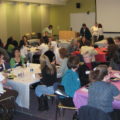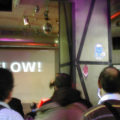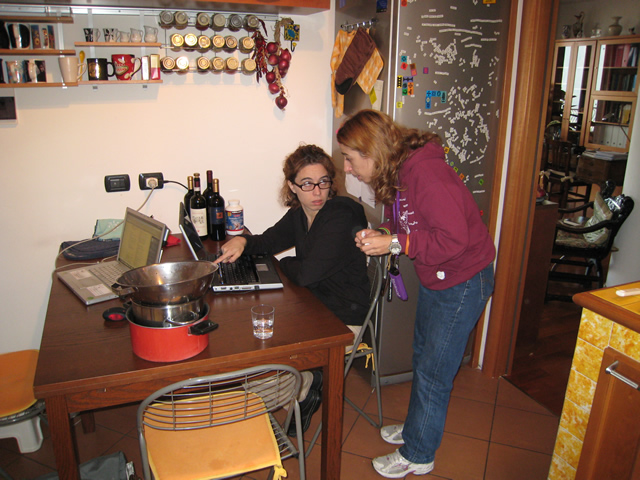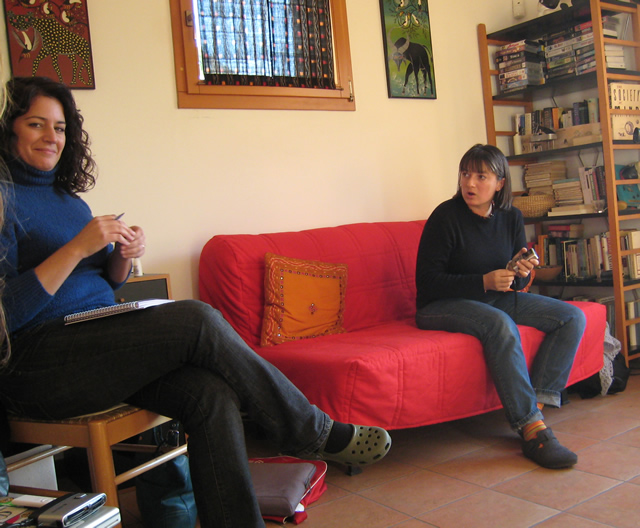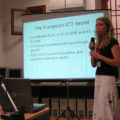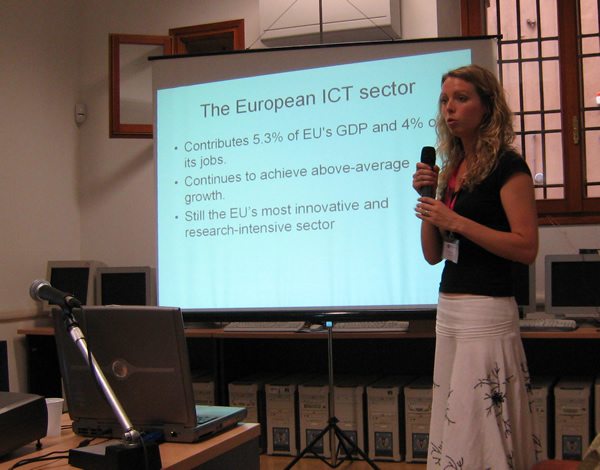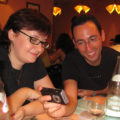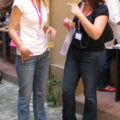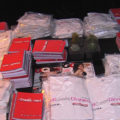In the afternoon I attended some sessions, though I missed the most popular presentation of the day, Iocelopiulunghismo (“Mine’s-the-biggest-ism”), by Elena and Feba, a funny and ironic look at (male) bloggers’ obsession with their (blog) statistics.
I poked my head into Andrea Beggi‘s unfortunately-titled presentation on “Blogging for Ladies,” but the room was so crowded I couldn’t stay. I hope and assume that he intended the title to be tongue-in-cheek, but it was risky, and evidently a number of people did not take it as ironic. After what was apparently a useful bunch of technical how-to’s on getting more traffic to one’s blog, he came in for some flak about “what makes you so sure women want more traffic to their blogs?”
If this comment was really made, it was more than a bit silly. There are indeed private blogs intended for specific, closed audiences (e.g. one’s family), and hopefully the people who write them are smart enough to make them accessible only to the desired readers. But anyone else who’s blogging probably does want to be found and read – if you blog and nobody reads you, have you truly blogged at all?
I attended a session on women in the open source community, basically a report of statistics which, while I had not heard them before, did not surprise me in the least. I knew instinctively that women are a small percentage of the people working on open source software (I can remember seeing only one on my particular beat – storage – in the OpenSolaris.org forums). The interesting question is: why are there so few? One possible answer (given) is that people tend to do open source work in their free time, which women have less of than men (this is not fair, but that’s a topic for another time).
Something was said about technologies designed by and for women, a concept that wasn’t clear to me. In that context, we certainly weren’t talking about recipe organizers. Marzia responded with an example, Cercatrice di Rete (“Web Searcher”, the word searcher being in the feminine in this case), which she explained in more detail the next day at the E-Wit conference. It’s a search engine tuned to highlight women’s issues, e.g. searching on violenza returns results related to violence against women.
I suppose it’s one more example of a vertical search engine. I may be missing the point but, if I wanted to research “violence against women”, wouldn’t I just type that in? And if I needed immediate resources to protect me against an abusive spouse (the example Marzia seemed to have in mind), I would probably search on something more to the point, like: “how to murder your husband and get away with it.”
When it was my turn to present, I was disappointed that few of the younger women I’d seen at the camp were in the room. I was aiming mostly at them in my talk Fuori dagli Schemi – Aneddoti e Lezioni di Una Carriera Insolita (“Outside the Box: Anecdotes and Lessons from an Unusual Career”). I was afraid that what I had to share would be obvious to career women closer to my own age (well, okay, in their 30s), who seemed to be the bulk of my audience.
But several friends were present to cheer me on, and everyone seemed enthusiastic in spite of my quavering delivery in unusually shaky Italian (a result of nerves plus jet lag). If you want to hear it, go to this page and look for my name (towards the bottom), and click video at the end of that line (actually, it doesn’t sound as shaky as I had feared, though the grammar is not perfect).
Afterwards one woman told me she had needed to hear my admonition to “make sure the people who count know about the work you’re doing”, because she, too, had suffered from accomplishments that went unnoticed.
There wasn’t time for discussion, unfortunately, so I missed the opportunity to raise the question of what next steps the group could take for us women to help each other in our professional IT careers. I do have some ideas, though, which I’ll be discussing shortly in these pages.
Lele then got up to introduce a group of “cheerleaders.” I was about to rip his head off – the idea that my “go get ’em girls” talk should be immediately followed by sexist, male-pleasing bullshit was just too much. Then I realized that he had been asked to introduce a presentation I’d been curious about, “Save the Cheerleader, Save the World,” on gender in the fan communities of Heroes. Lele had gotten the wrong end of the stick in introducing the three young women doing the presentation as cheerleaders – the cheerleader referred to is character Claire Bennett.
One of the three did a good job of presenting the research carried out by a (mixed gender) group of students at the University of Urbino, but we didn’t actually hear any conclusions: those will be presented in a video to be posted on YouTube. It’s a pity her two colleagues didn’t get to speak, and I wasn’t sure of any of their names as Lele made a joke of them. But I appreciated that they had stood in the audience and smiled at me through my own presentation – I hope they gained something from it (e.g., don’t let someone else do all the talking for you, even if she’s female). later – I know at least one of them did: she left a very nice comment.
Amanda then gave a well-researched presentation on women in IT in Europe. That ties in well with what I heard the next day at the E-Wit conference, so I will talk about it in that context, in a future article.
Organization
There’s been a lot of bitching about how hot and crowded the venue was. In fact there would have been a lovely and capacious alternative venue, the one used for E-Wit the next day, in quarters shared between the Women’s Library of Bologna and the University of Bologna’s Department of Visual Arts.
However, as Federica (one of the organizers) explained to me, Internet access there was so hemmed about with firewalls that it would have been impossible to stream the video which allowed people from all over Italy (and the world) to follow the event live. Many of us present had also attended RitaliaCamp, hosted at a branch of the University of Milan which turned out to be very grudging in allowing attendees network access, to everyone’s frustration. (Hyper-bloggers gasp like fish out of water if cut off from Internet access for more than 15 minutes.)
The organizers of FemCamp opted instead for via San Felice, and, thanks to a sponsor, were able to provide the best wireless coverage anybody has yet seen at a camp in Italy – lack of which would surely have been cause for complaint at the other venue (note to conference organizers: you can never please everybody).

